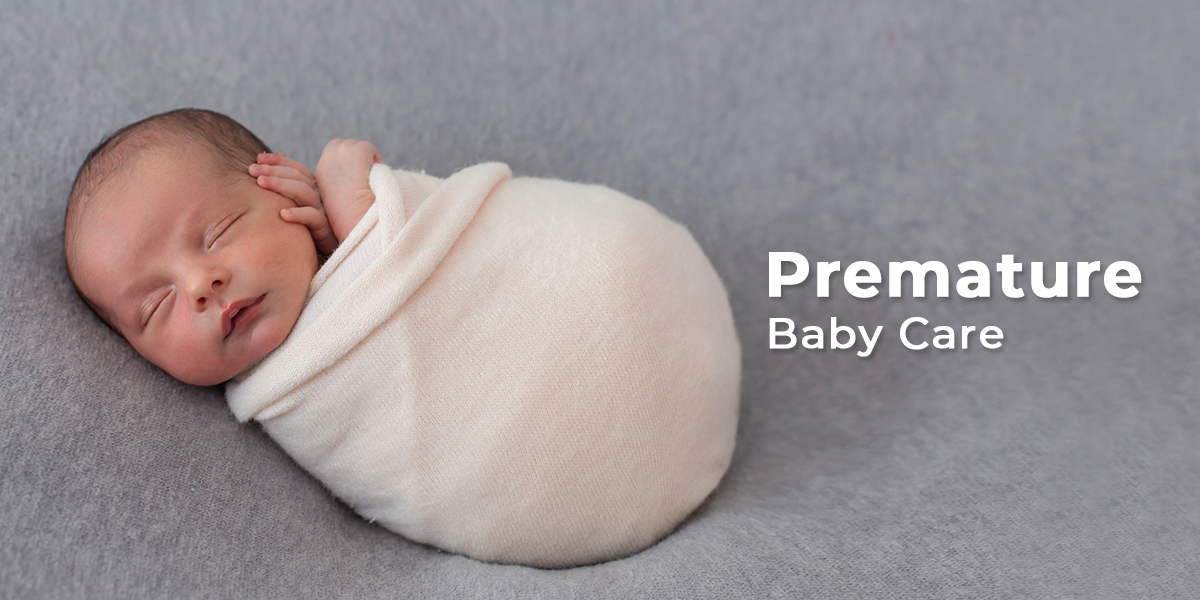Premature baby
Babies born before the 37th week of pregnancy are premature babies (or) preemies. Mothers are often scared and nervous about caring for a premature baby. Premature born are at increased risk of complications, and the risks increase after the baby is born before 37 weeks. Any complication of a premature newborn is managed and taken care of by paediatric and neonatologists in the Neonatal Intensive Care Unit (NICU).
Why do premature newborns need special care?
Premature babies are not fully developed to deal with life in our world. Their little bodies have underdeveloped parts including the lungs, digestive system, immune system, and skin. Fortunately, medical technology has enabled premature babies to survive the first few days, weeks, or months of life until they are strong enough to fend for themselves.
What is a Neonatal Intensive Care Unit (NICU)
The NICU is your newborn’s protective environment and home for a limited period. Therefore, it is advisable to familiarize yourself with it as much as possible. The NICU is equipped with attentive staff, monitoring and alarm systems, respiratory and resuscitation equipment, access to physicians in all paediatric specialities and 24-hour laboratory service.
Monitoring and alarm systems inside NICU
Monitoring machines differ depending on the hospital and NICU. However, monitors are similar in that they all record heart rate, respiratory rate, blood pressure, and temperature. A pulse oximeter is used in NICU to measure the amount of oxygen in the blood.
You might notice that a newborn has various sticky pads or cuffs on the chest, legs, arms or other parts of the body. These pads and cuffs have wires connecting to monitor your baby’s condition and alert periodically. Alarms are periodic inside NICU. The alarm is a routine matter and not an emergency concern always.
Respiratory support
- The endotracheal tube is placed in the newborn trachea to deliver warm, humidified air and oxygen.
- A ventilator is a respirator connected to the endotracheal tube that controls the amount of oxygen, air pressure and the number of breaths.
- Continuous positive airway pressure (C-PAP): is used for babies to breathe but need help getting air into their lungs.
- The oxygen hood is a clear plastic box that fits over the baby’s head and is connected to a tube that pumps oxygen to the baby.
Methods of Feeding
- Intravenous lines carry nutrition directly into the baby’s bloodstream. It is used for premature babies with immature digestive systems who cannot suck, swallow, or breathe normally. It is to treat other health complications in babies. This approach uses an IV placed in the scalp, arm, or leg.
- Umbilical catheter: a tube surgically placed into a vessel in the umbilical cord of a neonate. Neonatologist recommends it only when a baby need this feeding for several weeks. The umbilical catheter is a safe and effective method to feed nutrients to babies.
- Oral and nasal feeding: a narrow, flexible tube passed through the nose (nasogastric tube) or mouth (orogastric tube). It is a solution for babies ready to digest breast milk or formula but cannot suck, swallow and breathe naturally.
- A central line (sometimes called a PICC line) is an IV line inserted into a vein, often in the arm, allowing the use of a larger vein. A method of delivering nutrients and medications that could otherwise irritate smaller veins.
Other equipment in NICU
- Incubators are clear plastic cribs that keep babies warm and help protect them from germs and noise.
- Bili Lights: A bright blue fluorescent light is placed over the baby’s incubator to treat jaundice (yellowing of the skin and eyes).
Staffs at Dr. Mehta’s NICU
A neonatologist, paediatrician, nurses and supporting doctors inside the NICU take care of sick and premature babies. Our NICU staffs and doctors have enough experience in treating premature babies and are supportive. Knowing that your newborn is receiving the best possible care from Dr. Mehta’s Hospitals.
Kangaroo care for premature babies
The kangaroo method is a technique in which mothers place premature babies upright on their mother’s bare chest and allow for tummy-to-tummy contact between baby and mother. The baby’s head is turned so that its ear is over the mother’s heart. Many studies have shown that the Kangaroo Method offers significant benefits.
- Body temperature: Studies have shown that a mother has thermal synchrony with her baby and that if her baby were cold, her body temperature would rise to warm the baby and vice versa.
- Breastfeeding: The kangaroo method allows easy access to the breast and skin-to-skin contact that increases milk letdown.
- Increase weight gain: The kangaroo care allows the baby to fall into a deeper sleep and direct more energy to other bodily functions. Greater weight gain also means a shorter hospital stay.
Breastfeeding your preemie

We’ve all heard how breastfeeding strengthens a baby’s immune system and increases the emotional connections between a mother and her baby. Most babies born between 35 and 37 weeks can go directly to breastfeeding. Most premature newborns, between 25- and 29 weeks of gestational age, are fed intravenously or by tube.
Therefore, if you plan to breastfeed, inform your doctor and nurses immediately after birth. You can then express and store your breast milk for when your baby is ready. Your baby’s digestive system and electrolyte control will determine when you can take your breast milk through a tube and when you can use your stored breast milk. Once the baby’s respiratory system stabilises, you can start breastfeeding.
Dr. Mehta’s NICU – Home-like care
The birth of a baby is a cause for celebration but can sometimes be cause for alarm. Some babies are born with critical illnesses or conditions that require special treatment at a specialized centre. We have the best NICU to care for critically ill babies. Our Level 3 NICU is equipped with the latest life-saving and life-support technology. Experienced neonatal specialists provide the best medical and surgical treatment for newborns, and well-trained nurses provide compassionate care during recovery.
Our 24×7 ambulance service, equipped with life-saving equipment, is available to transport babies in need of treatment from any hospital in the city to our NICU. The best environment for recovery is provided in Dr. Mehta’s NICU.


